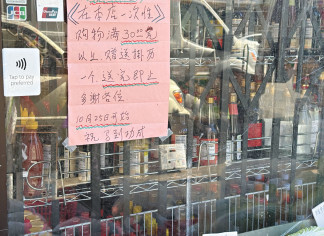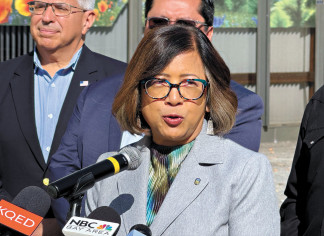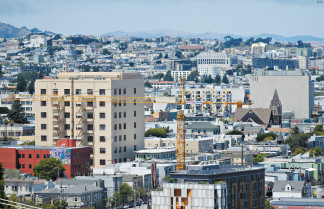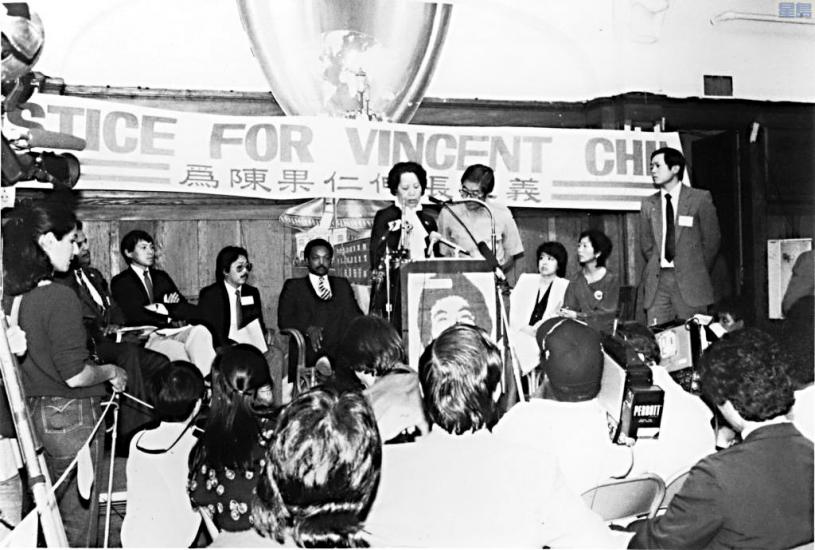
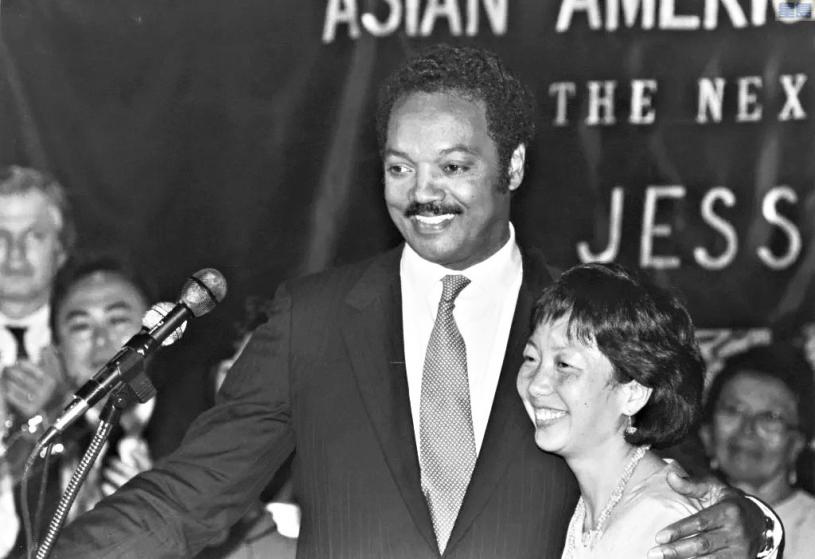
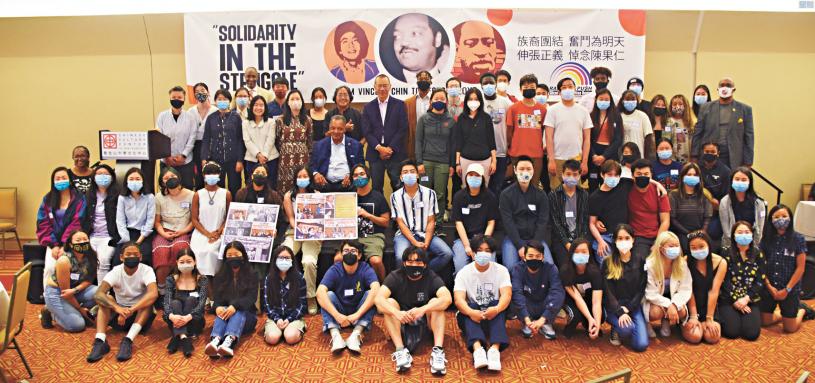
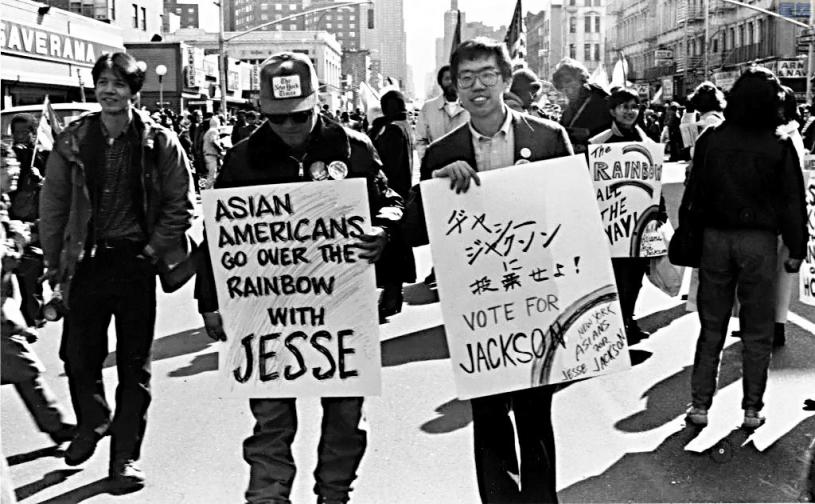
(作者:鄧式美)
40年前的6月23日,陳果仁慘死於兩名白人男子之手。我們從中吸取了哪些教訓?我們又將何去何從?
「陳果仁案及其引發的正義運動給所有人上了一課,這一課是關於如何組織及團結亞裔與美國黑人,及其他族裔、擁有不同信仰和來自各行各業的人,共同反對不公義,建立一個安全,包容及互愛的社區。」
「今天的疫情和反亞裔仇恨與20世紀80年代的反亞裔仇恨有著不可思議的相似之處。美國公民正義會(簡稱ACJ) 的創立原則是陳果仁遺產的重要組成部分:我們的運動致力於為所有人爭取平等的正義,並反對任何形式的種族主義和歧視。」「正如陳果仁的母親陳余瓊芳女士在國家電視台上所說的,『我們的膚色或許不同,但我們留的血液是一樣的。』」
以上是Vincent Chin 40th Remembrance & Rededication委員會,陳余瓊芳和陳果仁的遺產執行人,謝漢蘭發表的聲明。(取自VincentChin.org英文原文)
1982年,羅納德.埃本斯(Ronald Ebens)和邁克爾.尼茨(Michael Nitz)用棒球棍殘忍地殺害了陳果仁,隨後法官考夫曼對這兩名兇手判處了三年緩刑和3000美元罰款。這一錯判喚醒與激發了全美亞裔的集結。為陳果仁伸張正義的工作引發了當代亞裔美國民權運動,誕生了一大批新的社會活動家,投身於捍衛多族群的民主。隨著80年代的這一代活動家競選公職,美國因此樹立起了一種新的良知。亞裔領袖們建立多種族聯盟,成為社區建設、勞工、公民權利、移民權利、婦女群體、LGBTQ群體、環境正義和世界和平的領導者。
我也是生活軌跡被永遠改變了的新一代的一員。我與一群志同道合的人一起工作,互相學習,與他們並肩作戰經歷了無數寒暑。在陳果仁被殺害的四十年後的今天,謙虛與大家回顧陳果仁運動、華裔與美國黑人運動、民權領袖傑西.傑克遜(Jesse Jackson)、和彩虹聯盟的工作教訓和感懷。
傑克遜牧師為陳果仁伸張正義
1983年,作為民主黨總統候選人的傑克遜牧師,是為陳果仁伸張正義的運動的全國領導者。他專程來到華埠金美倫堂,參加了一次歷史性的聚會,與陳余瓊芳女士會面,兩人立即建立了聯繫。傑克遜牧師將1955年發生在密西西比州,因被指控向一名白人婦女「吹口哨」,後被一群白人暴徒綁架、折磨並處以私刑的14歲黑人少年埃米特.蒂爾(Emmett Till)的故事進行了類比。當時陪審團商討了30分鐘,裁定所有白人殺手無罪釋放。有人問陪審團,「為什麼商議的時間這麼短?」他們回答說:「如果我們沒有抽了一支煙及喝了飲料,商討的時間會更短」。陪審團無法想像將白人判處入獄。指控埃米特.蒂爾的女事主在臨死前供認,她對「被襲擊事件」撒了謊,其實這件事情從未發生過。
傑克遜牧師提出這個類比,指出「他們」無法想像白人因殺害黑人或亞裔而被送進監獄。在當年沒有正義,今天也沒有正義。
埃米特.蒂爾引發了南方的黑人運動,並且激起了六十年代由馬丁路德金領導的黑人權力運動。陳果仁事件引發了八十年代亞裔民權運動。
華人與黑人團結歷史悠久
1983年,當傑西.傑克遜宣布參選總統時,亞裔為爭取更多民主和更高層次的政治代表,出現了一個全新的動員水平,聲援非裔民主黨總統候選人。1984年,我有幸成為「亞裔支持傑克遜協會」的創始人之一,並於1988年被任命為傑克遜競選活動的加州聯合主席,與國會女議員瑪克辛.沃特斯(Maxine Waters)一起工作,並且向她學習。在接下來的二十年裡,一群亞裔進步派,包括Mike Murase、Butch Wing、Ying Lee Kelly、Eddie Wong、Cindy Ng、May Louie及三藩市華人進步會、羅省Little Tokyo People’s Rights Organization與非裔社區、黑人教堂合作。我們中的一部份人成為傑西.傑克遜的競選工作人員,及全國彩虹聯盟的團隊。另一些則是在紐約州和加州支援黑人候選人及擔任幕僚。而我,在傑克遜的鼓勵下,競選公職而成為三藩市首位亞裔女性市參事,致力於為亞裔、草根階層發聲,並與弱勢族群搭建橋樑。
心得:族裔之間的對話,互動及團結是長期的投資。傑克遜說,「我認識陳果仁媽媽的時候,我深感她的悲哀痛苦。亞裔百多年受到的歧視及傷害已經成為我的一部分,亞裔的奮鬥永遠改變了我。」我自己亦感同身受,當我到訪傑克遜在Greenville, South Carolina的家鄉,聽他講述種族隔離制度,黑人遭仇恨的悲痛經歷,我們分享感受,這一切深深印在我腦海,豐富了我的視野及思考能力。
我們不能再生活在彼此的同溫層裡。族裔的互動及彩虹聯盟的嘗試是為了找出我們的共同點,並將我們的歷史連接起來。當我們在爭取更偉大的多種族民主的鬥爭中,無論成功或失敗,我們也建立了終身的信任與關係。
今天:把我們的故事獻給新一代
今天的政治大氣候與80年代息息相關:包括建立社區和政治力量、競選公職、為被壓迫者而發聲、與黑人、有色人種和酷兒群體團結一致,以及挺身而出反對右翼的攻擊,在陳果仁被殺當年,延至今天仍是真理。
隨著特朗普入主白宮的四年,右翼茶黨,白人至上主義的興起和加劇,美國變得更加兩極分化。亞裔、黑人、拉美裔、有色人種、猶太裔、南亞裔和酷兒群體一直是仇恨暴力和殺戮的目標。一個寶貴的教訓是,我們必須找到為大眾而不只是為自己而戰的能力。這就是我們的集體力量。
因此講述我們的故事,讓下一代知道我們為他們做了什麼,鼓勵他們能為未來做些什麼,這對我們來說更為重要。
讓「我們」成為一場運動和一個思想流派。讓「我們」成為海洋中永不消失的暗流。
作者
鄧式美受到啟發開始競選公職,並於1994年當選三藩市首位亞裔女性市參事。她在任三藩市估值官期間,由市長紐森指派組織同性婚姻登記,作為一個具有開創性的公共服務角色。這一網絡使她能夠在組織、宣傳和社區建設中利用自己多年來在社會正義運動中所積累的基層領導能力。鄧式美從1990年開始競選公職,直到2015年退任。她利用自己在公職生涯中積累的經驗回饋華埠,勉勵年輕領袖,繼續為人民服務。
A Personal Reflection on Asian & Black Solidarity in Remembrance of 40th Anniversary of Vincent Chin
On June 23 four decades ago, Vincent Chin died a brutal death at the hands of two white men. What lessons have we learned and where do we go from here
“The legacy of Vincent Chin and the campaign for justice offers lessons to all on how people of all races, including between Asian and Black Americans, and from all creeds and walks of life, can organize and come together to stand against intolerance of all kinds to build a beloved community that is safe and welcoming to all.”
“Today’s pandemic and anti-Asian hate has uncanny parallels to the anti-Asian hate of the 1980’s. American Citizens for Justice’s (ACJ) founding principles are an important part of Vincent’s legacy: our movement’s commitment to equal justice for all and a stand against racism and discrimination of any kind”. “As Vincent’s mother, Lily, said on national television, ‘Our skin color may be different, but our blood is the same’”. (Statement On Behalf Of The Vincent And Lily Chin Estate, quoted from Vincent Chin 40th Remembrance & Rededication) Led by The Chin Estate, American Citizens for Justice and the Planning Committee, Vincent Chin 40th Remembrance & Rededication convening is expected to unite justice leaders from across the country from June 16-19 in Detroit.
The 1982 horrific and hateful killing of Vincent Chin by Ronald Ebens and Michael Nitz, and the subsequent sentencing by Judge Kaufman for the two killers to three years’ probation and $3000 in fines awakened, and galvanized Asian Americans into action. The justice for Vincent Chin work sparked the contemporary Asian American civil rights movement, which swept a seawave of activists to dedicate themselves to champion for multi-racial democracy. America built a new consciousness as this generation of 80’s activists ran for elected office, built multi racial coalitions, became leaders in community-building, labor, civil rights, immigrant rights, women, LGBTQ, environmental justice and world peace.
I was among this new generation whose life was forever changed. I worked with, learned from, mentored by and fought side by side with many whom I consider lifelong friends. Four decades after the killing of Vincent Chin, it is more relevant than ever to recall the lessons and inspiration
sparked by the Vincent Chin movement, work with the Rev Jesse Jackson, Black Movement and the Rainbow Coalition. I humbly offer my personal reflections.
Rev Jackson and Justice for Vincent Chin
In 1983, Rev Jackson was among the first national leaders and an American presidential candidate to support the Justice for Vincent Chin movement. He came to Cameron House in an historic gathering to meet Mrs. Lily Chin and they instantly connected. Rev Jackson drew the parallel about the story of Emmett Till, a 14 year old black teenager accused of whistling at a white woman in Money, Mississippi in 1955.
Till was later abducted, tortured and murdered by a group of white men. At their trial, The jury was out for only 30 minutes and found the white killers not guilty. Someone asked the jury, “why so short ” and they said, “well it would have been shorter except we stopped for a cigarette and a soft drink.” The jury couldn’t imagine sending a white person to jail for killing a black teenager. The woman who accused Emmett Till confessed before she died that she lied about the assault. It never happened.
Rev Jackson drew the parallel, that “they” couldn’t imagine sending white people to jail for killing blacks or Asians. In the Chin case, Judge Charles Kaufman handed out a sentence of 3-year probation and a small fine saying, “These weren’t the kind of men you send to jail…” There was no justice then, there is no justice today. Emmett Till triggered the Black movement in the South, and gave birth to the Black Power Movement. Similarly, Vincent
Chin’s murder triggere the contemporary Asian Civil Rights movement.
Asian and Black Solidarity
When Jesse Jackson announced his candidacy for President in 1983, a whole new level of mobilization arose among Asian Americans in solidarity with the African American-led effort for greater impact. Movement activists and organizations such as the Chinese Progressive Association (CPA) in San Francisco and Little Tokyo People’s Rights Organization ( LTPRO) in Los Angeles were the foundation for Asian activism in the Jackson campaign. Along with Butch Wing, Eddie Wong, Mike Murase, I had the honor to be one of the founders of Asian Americans for Jesse Jackson in 1984. In 1988 I served as the California co-chair of the Jesse Jackson campaign, worked alongside and learned from Congresswoman Maxine Waters. Cindy Ng served as the co-chair of the New York State Rainbow Coalition and later speech writer for New York Mayor David Dinkins. May was chairperson of the Boston Rainbow Coalition, then chief of staff of the National Rainbow Coalition. Mike served as California Campaign Director, later as Congresswoman Maxine Waters’ District Director . For the next two decades, we worked with the African American communities and Black churches. Eddie and Butch continued to staff Jesse Jackson and Rainbow/PUSH until Butch’s recent retirement. I was among those who ran for office to be a voice for bridge building and grassroot empowerment.
There are valuable lessons on Black-Asian solidarity and coalition building: The mutual respect and relationship built was transformative. Jesse Jackson often told us that when we invited him to the Day of Remembrance program and he had a chance to meet Japanese Americans who had been interned or when he came to Chinatown and met the “lo wah que” he felt our shared pain. Similarly, Jesse brought us to the Black church and took us on a tour of his neighborhood in segregated Greenville, South Carolina where we spent time together, broke bread, and shared our stories of sorrow and joy.
Coalition building is a long term relationship based on embracing each other’s histories, heritage and aspirations. We no longer live in our little silos and the attempt of the Rainbow was to find out what we shared in common, to connect our histories and to strengthen our struggles. Lifelong trust and relationships were built as we won and lost battles in the fight for greater multiracial democracy.
Today: We must tell our story and bring the siloed pieces together
America is more polarized today with the rise of White Supremacy, Right Wing Tea Party fueled by four years of Donald Trump in the White House. Asian Americans, blacks, LatinX, Muslims, Jews, queers and people of color have been the target of hate violence and killings. A valuable lesson is that we must find the capacity to fight for others rather than among ourselves. That is where our collective strength will be.
What was relevant in the 80’s to build community and political power, to run for office, to fight for the oppressed, to be a voice for the poor, to stand in solidarity with blacks, people of color and queers, and to stand tall against the Right Wing onslaught continues to hold true today. Jesse Jackson has always said, “ It is more relevant to us now, to tell our story and keep building so the next generation is empowered knowing what we did for them, and what they can do for the future.”
Let “us” become a movement and a school of thought. Let “us” be the undercurrent in the ocean, that will never go away.
The author
Mabel Teng was inspired to run for office after her work with Jesse Jackson, becoming the first-ever elected Asian American woman of the San Francisco Board of Supervisors in a city–wide election in 1994. Mabel served as the co-chair of Asian Americans for Jesse Jackson in 1984 and northern California co-chair of the Jesse Jackson for President campaign in 1988. In a pioneering public service role, Mabel cultivated a broad network of political leaders and government officials. This network allowed her to leverage her years of grassroots leadership in the social justice movement, from organizing, advocacy to community building. Mabel’s public service in elected office spanned from 1990 – 2015 when she retired as the Assessor of the City and County of San Francisco. She parlayed her career in public office to return to Chinatown to mentor young leaders and serve the people.






